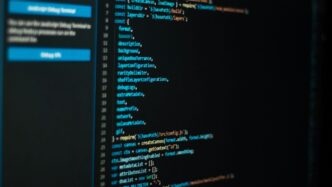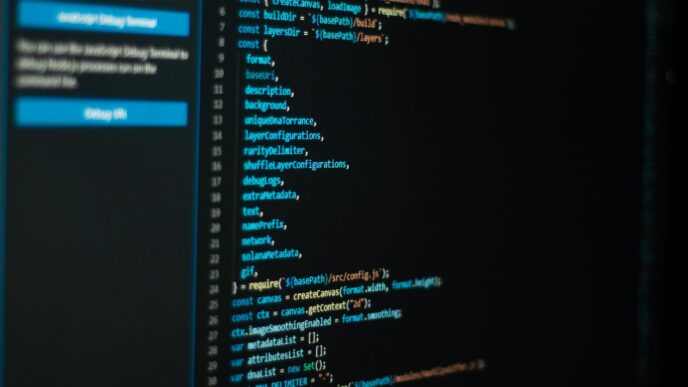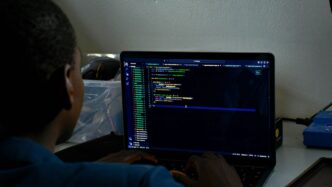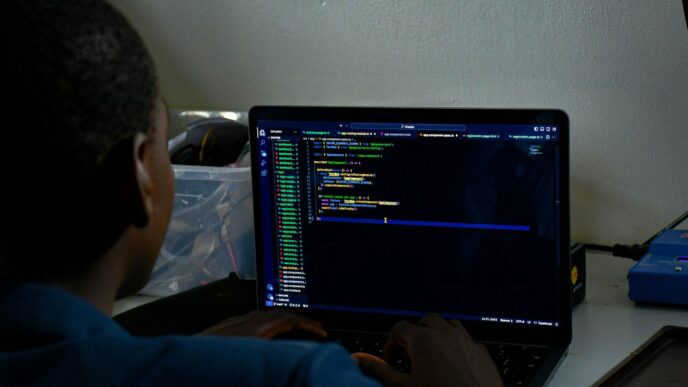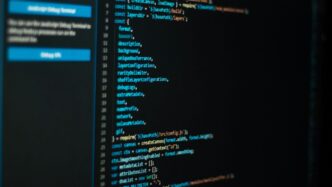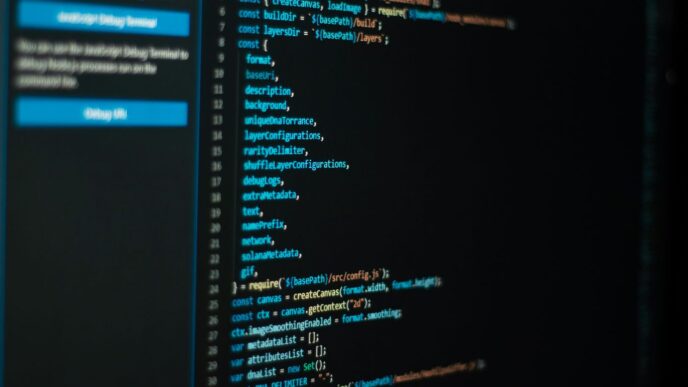Getting into competitive programming can feel like a lot at first. You’re trying to solve problems, make your code run fast, and not use too much memory. It’s a bit like a sport. But with tools like the CodeChef IDE, it becomes much more manageable. This guide will walk you through how to use it to get better at coding challenges.
Key Takeaways
- The CodeChef IDE lets you code right in your browser, making it easy to start practicing with their problem sets.
- Understanding time and memory limits is key; your code needs to be both fast and efficient.
- Regular practice and participating in contests are important for improvement, even if you don’t solve every problem.
- Start with simpler programming languages and problems, then gradually move to more complex topics.
- Learning from others’ solutions and editorials can help you find better ways to solve problems.
Getting Started with the CodeChef IDE

So, you’re looking to jump into competitive programming, huh? It can seem a bit daunting at first, but honestly, it’s like learning any new skill. You start with the basics, and before you know it, you’re tackling bigger challenges. CodeChef is a fantastic place to begin this journey, and their online IDE makes it super accessible.
Understanding the Competitive Programming Landscape
Competitive programming is all about solving problems using code, usually within specific time and memory limits. Think of it like a puzzle-solving sport. You’re given a problem, and you need to write a program that finds the correct answer efficiently. It’s not just about knowing a language; it’s about how you think and approach problems. Many people start with platforms like CodeChef because they offer a structured way to learn and practice. You’ll find problems categorized by difficulty and topic, which is really helpful when you’re just starting out. It’s a good idea to get a feel for what these platforms are like, and CodeChef’s practice page is a great place to explore.
Choosing Your First Programming Language
When you’re starting, you might wonder which language to pick. For competitive programming, C++, Java, and Python are the most common choices. C++ is often favored for its speed and control over memory, which can be important when dealing with tight time limits. Java is also quite popular, especially for its robust libraries. Python, while sometimes a bit slower, is known for its readability and ease of use, making it a good option for beginners. Don’t stress too much about this choice right now; the core concepts of problem-solving are more important than the specific language. You can always pick up another language later if you need to.
Navigating Practice Platforms
Once you’ve got a language in mind, the next step is to get comfortable with a practice platform. CodeChef is a prime example. You’ll want to get familiar with how to:
- Sign up for an account: This is usually straightforward, just like any other website.
- Browse problems: Look for sections that categorize problems by difficulty or topic. Starting with ‘easy’ or beginner-level problems is key.
- Use the online editor: Most platforms, including CodeChef, have an integrated coding environment where you can write, compile, and submit your solutions directly in your browser. This means you don’t need to install anything on your computer to get started.
- Understand submission feedback: After you submit your code, the platform will tell you if it passed the test cases or if there was an error. Learning to interpret this feedback is a big part of the process.
Leveraging the CodeChef IDE for Practice
So, you’ve got the basics down and you’re ready to really start grinding. The CodeChef IDE is a pretty neat tool for this. It’s right there in your browser, so you don’t have to mess with setting up a bunch of software on your computer just to try out a problem. It’s all about making it easy to jump in and start coding.
Coding Directly in the Browser
This is probably the biggest perk. You can access a whole bunch of problems and start writing your solutions without any installation hassle. It’s like having a coding playground ready to go whenever you are. You just pick a problem, start typing, and hit compile. It’s a straightforward way to get your practice in, and it means you can code from pretty much anywhere with an internet connection. This makes it super convenient for fitting in some practice between classes or during a break.
Utilizing CodeChef’s Problem Sets
CodeChef has a massive collection of problems, and they’re organized pretty well. You can find problems based on difficulty, topic, or even specific contests you might have missed. This is really helpful because you can target areas you need to work on. For example, if you’re struggling with dynamic programming, you can filter for those types of problems and just hammer them out. It’s a structured way to build your skills, moving from easier stuff to more complex challenges as you improve. They really do have a lot of questions, so you won’t run out of things to practice anytime soon. You can find a lot of these problems organized on the CodeChef platform.
Analyzing Solutions and Editorials
After you’ve tried a problem, or if you get stuck, CodeChef provides editorials. These are basically explanations of how to solve the problem, often including different approaches and the logic behind them. It’s not just about getting the right answer; it’s about understanding why it’s the right answer and how you could have gotten there faster or more efficiently. Looking at editorials from other coders can also show you different ways to think about a problem, which is super useful for expanding your own problem-solving toolkit. It’s a great way to learn from your mistakes and see how experienced programmers tackle challenges.
Essential Concepts for Competitive Programming
So, you’re looking to get good at competitive programming? That’s awesome. It’s not just about typing code really fast, though that helps. It’s more about figuring out how to solve problems efficiently, especially when the computer is watching the clock and how much memory you’re using.
Mastering Data Structures and Algorithms
This is really the heart of it all. You can’t solve complex problems without knowing how to organize data and what methods work best for certain tasks. Think of data structures as different ways to store and manage information. For example, an array is simple, but if you need to quickly find something or keep things sorted, a balanced binary search tree might be better. Algorithms are the step-by-step instructions to solve a problem. You’ll want to get familiar with common ones like sorting algorithms (like quicksort or mergesort), searching algorithms (like binary search), and graph traversal algorithms (like BFS and DFS).
- Arrays and Strings: Basic, but you’ll use them constantly.
- Linked Lists, Stacks, and Queues: Good for managing sequences and order.
- Trees and Graphs: For representing relationships and networks.
- Hash Tables: Great for fast lookups.
- Sorting and Searching: You need to know these inside out.
- Dynamic Programming: A powerful technique for optimization problems.
Getting a handle on these will make a huge difference. You can find tons of resources online, like GeeksforGeeks which has detailed explanations for almost everything.
Understanding Time and Memory Limits
This is where competitive programming gets tricky. Problems usually come with strict limits on how long your program can run (time limit) and how much memory it can use (memory limit). Your solution needs to be correct, but it also needs to be fast and not hog resources. This is why knowing algorithm complexity, often expressed using Big O notation, is so important. An algorithm that works fine for 10 items might completely fail if you give it a million items. You need to pick algorithms that scale well. For instance, a brute-force approach might take too long, so you’ll need a more optimized algorithm.
Here’s a rough idea of what’s usually acceptable:
| Operation Type | Typical Time Limit (per operation) |
|---|---|
| Simple arithmetic | Nanoseconds (10^-9 s) |
| Comparisons, assignments | Nanoseconds (10^-9 s) |
| Array access | Nanoseconds (10^-9 s) |
| Function call | Nanoseconds (10^-9 s) |
Keep in mind that a typical time limit for a whole problem might be 1-2 seconds, and you’re usually dealing with millions of operations. So, an O(n^2) algorithm might be too slow if ‘n’ is large, while an O(n log n) or O(n) algorithm would likely pass.
Developing Problem-Solving Strategies
Beyond just knowing algorithms, you need a plan for tackling new problems. It’s easy to just jump into coding, but that often leads to mistakes or solving the wrong thing. A good strategy involves several steps:
- Read Carefully: Understand exactly what the problem is asking. Don’t skim. Pay attention to all the rules and constraints.
- Test Cases: Think about different inputs. What are the simplest cases? What about edge cases, like empty inputs, very large numbers, or negative numbers? Try to come up with your own test cases before you even start coding.
- Plan Your Approach: Before writing code, sketch out your algorithm. What data structures will you use? What are the main steps?
- Code and Debug: Write your code based on your plan. Test it with your own cases and then the provided examples. If it fails, figure out why. Debugging is a skill in itself.
- Optimize and Refine: Once you have a working solution, see if you can make it faster or use less memory. Can you use a different data structure? Is there a simpler algorithm?
It takes practice, but developing a systematic approach will save you a lot of frustration and help you solve problems more reliably.
Enhancing Your Coding Workflow
Getting your coding environment set up just right can make a big difference in how fast and how well you can solve problems. It’s not just about writing code; it’s about making the whole process smoother.
Setting Up Your Local Development Environment
While online platforms are great for starting, many competitive programmers eventually prefer setting up their own coding space on their computer. This gives you more control and lets you use your favorite tools. Think about using a good text editor or a full-fledged Integrated Development Environment (IDE). Some popular choices include:
- Visual Studio Code: It’s free, super flexible with tons of extensions, and works well for almost any language. Many find it a good balance between being easy to use and powerful.
- Sublime Text: If you want something lightweight and fast, Sublime Text is a solid option. It’s known for its speed and clean interface.
- Vim/Neovim: For those who love keyboard-centric workflows and deep customization, Vim or Neovim are powerful choices, though they have a steeper learning curve.
- CLion/PyCharm: If you primarily code in C++ or Python, these IDEs from JetBrains offer excellent built-in features for debugging and code analysis. Student licenses are often available.
Setting up a local environment means you can test your code more thoroughly before submitting it to a contest platform. It’s worth spending some time to get this right.
Exploring Browser Extensions for Competitive Programming
Sometimes, small tools can really speed things up. Browser extensions can add helpful features directly to the websites you use most for practice. For example, extensions can:
- Add keyboard shortcuts to platforms like Codeforces, letting you perform common actions faster.
- Help you save code snippets you might want to reuse later.
- Improve the user interface of contest sites, making them easier to navigate.
- Offer features like a dark mode, which can be easier on your eyes during long coding sessions.
These little helpers can make your daily practice feel more efficient. You can find many of these on your browser’s extension store. It’s a good idea to check out what’s available to see if anything fits your style. Integrating technology into your routine can really help businesses grow, and the same applies to your coding practice integrate technology.
Choosing the Right IDE for Your Needs
Deciding on the best IDE or editor is a personal journey. What works for one person might not work for another. Consider these points:
- Language Support: Make sure the IDE has good support for the programming languages you use most often.
- Features: Do you need advanced debugging tools, code completion, or integration with version control systems like Git?
- Performance: Some IDEs can be resource-heavy, so consider your computer’s capabilities.
- Customization: How much do you want to tweak the look and feel, or add custom plugins?
Experimenting with a few different options is the best way to find what clicks. Don’t be afraid to switch if your current setup isn’t working as well as you’d hoped. The goal is to find a tool that helps you focus on solving problems, not fighting your editor.
The Role of Contests and Consistency
Jumping into coding contests might seem a bit daunting at first, but honestly, it’s where the real learning happens. It’s not just about solving problems; it’s about learning to solve them fast and correctly under pressure. Think of it like training for a sport – you wouldn’t just read about it, right? You’d get out there and play.
Participating in CodeChef Contests
CodeChef offers a fantastic arena for this. They have regular contests that are great for getting a feel for the competitive environment. Don’t worry too much about your rating when you start. The main goal is to get used to the timed format and the types of problems you’ll see. It’s a good idea to try and participate in every live contest if you can. If you miss a live one, many platforms, including CodeChef, let you participate virtually. This way, you still get that practice under simulated contest conditions. It’s all about building that habit of showing up and trying.
The Importance of Regular Practice
Consistency is really the name of the game here. You can’t just code once a month and expect to see big improvements. Aim to solve a few problems each day. It doesn’t always have to be brand new, super hard problems. Sometimes, revisiting problems you solved a while back and trying to find a more efficient solution is just as beneficial. Think of it like this:
- Daily Coding: Try to solve 3-5 problems daily, gradually increasing the difficulty.
- Review Old Problems: Go back to problems you’ve solved before. Can you solve them faster or with less code now?
- Small Group Practice: If possible, team up with a friend or two for mini-contests. Discussing your approaches afterward is super helpful.
The key is to make coding a regular habit, not just a sporadic activity.
Learning from Mistakes and Other Coders
After a contest, the work isn’t over. In fact, it’s just beginning. This is where "upsolving" comes in. If you didn’t solve a problem during the contest, make it a point to solve it afterward. Even if you did solve a problem, check out the official editorials or other participants’ solutions. You might discover a much cleaner or faster way to solve it. This process of analyzing solutions, especially for problems you found tricky, is incredibly important for learning new techniques and improving your problem-solving toolkit. Don’t be afraid to look at hints or discuss problems with peers if you get stuck; it’s a normal part of the learning curve. Participating in coding contests is a great way to see how you stack up against others and learn from the experience.
Advancing Your Competitive Programming Skills
So, you’ve gotten the hang of the basics and maybe even participated in a few contests. That’s awesome! But competitive programming is a journey, not a destination. To really move up, you need to keep pushing yourself. This means tackling harder problems and learning new techniques.
Tackling More Complex Algorithms
Once you’re comfortable with standard data structures and algorithms, it’s time to explore the more advanced stuff. Think about topics like dynamic programming, graph algorithms (like Dijkstra’s or Floyd-Warshall), and string algorithms (like KMP or suffix arrays). These can seem intimidating at first, but they open up solutions to a whole new class of problems. Don’t just read about them; try to implement them yourself and solve problems that specifically use them. You can find great resources for these topics on sites like GeeksforGeeks or in books like "Competitive Programming 3" by Steven Halim and Felix Halim. Learning these advanced algorithms is key to solving harder problems.
Preparing for Technical Interviews
Many of the skills you build in competitive programming directly translate to doing well in technical interviews for software engineering jobs. Companies often ask questions that test your understanding of data structures, algorithms, and your ability to code efficiently under pressure. Practicing on platforms like LeetCode, which has a lot of interview-style questions, can be really helpful. It’s not just about knowing the algorithms; it’s about being able to explain your thought process and write clean, working code quickly. Many competitive programmers find that their interview performance improves significantly with consistent practice.
Joining the Competitive Programming Community
Don’t try to do this all alone! The competitive programming community is huge and generally very supportive. Joining online forums, Discord servers, or even local university clubs can be a great way to learn from others. You can discuss problems, get help when you’re stuck, and even form teams for team-based contests. Seeing how other people approach problems can give you new ideas and perspectives. Plus, it’s just more fun to share the experience with others. You might even find people to practice with regularly, which can make the whole process more enjoyable and effective. Participating in contests is a great way to see how you stack up against top coders from all over.
Wrapping Up Your Competitive Coding Journey
So, getting into competitive programming might seem like a big hurdle at first, but honestly, it’s totally doable if you just take it step by step. You’ve learned about picking the right language, finding good practice sites, and why reading problems carefully is super important. Remember, practicing regularly, looking at how others solve problems, and just keeping at it are the keys to getting better. Don’t be afraid to join contests, even if you don’t solve everything – it’s all part of the learning process. Keep coding, keep learning, and you’ll see yourself improve before you know it.
Frequently Asked Questions
What exactly is competitive programming?
Think of competitive programming like a fun sport for people who love to code! You get coding puzzles, and the goal is to solve them super fast and make sure your code works perfectly, using just the right amount of computer memory. It’s all about solving problems cleverly and efficiently.
Why should I try competitive programming?
It’s a fantastic way to boost your problem-solving skills and become a sharper thinker. Plus, it really helps you get ready for job interviews in the tech world and connects you with other coders from all over the globe. You’ll learn to code smarter and faster!
What programming language is best for beginners?
For starting out, languages like Python or Java are super helpful. They’re easier to learn, which means you can focus more on solving the coding challenges instead of getting stuck on complicated code rules.
Where can I practice competitive programming problems?
There are many great websites! Places like Codeforces, CodeChef, and LeetCode offer tons of problems sorted by how difficult they are. This lets you start with easier ones and slowly work your way up to tougher challenges as you get better.
How important are time and memory limits?
These limits are super important! They tell you how fast your code needs to run and how much memory it can use. You have to figure out clever ways to solve problems so your code is both speedy and doesn’t use too much computer resources.
How can I get better at competitive programming?
The key is to practice regularly! Try to solve a few problems every day, revisit problems you’ve already solved to see if you can find a better way, and always look at solutions and explanations (editorials) to learn new tricks and approaches. Joining contests is also a great way to test yourself.





